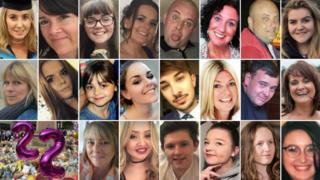 Image copyright Family handouts
Image copyright Family handouts
The public inquiry into the Manchester Arena terror attack begins later.
The hearing comes more than three years after Salman Abedi set off a bomb as people left a concert on 22 May 2017, killing himself and 22 others.
It was due to start in June, but was delayed by the trial of Abedi's brother Hashem, who was jailed for at least 55 years for 22 murders on 20 August .
The inquiry is being held at Manchester Magistrates' Court, less than a mile away from where the bombing happened.
The Manchester Arena Inquiry was established on 22 October 2019 by Home Secretary Priti Patel with the aim of investigating the victims' deaths.
Ms Patel said it was "vital that those who survived or lost loved ones... get the answers that they need and that we learn the lessons, whatever they may be".
It will have a much wider scope than Lord Kerslake's review of the "preparedness for and emergency response to" the attack, which in March 2018 concluded that there had been some failings in the response .
What is the Manchester Arena Inquiry?
The inquiry, which will be chaired by coroner Sir John Saunders, will "explore the circumstances leading up to and surrounding the terror attack", according to its website.
It will look at whether the attack could have been prevented, what happened on 22 May 2017, the security arrangements around the arena, the emergency response to the bombing and the radicalisation of Salman Abedi.
The inquiry will also hear how each of the individual victims died and hear personal evidence about them from their families.
Speaking in October, Ms Patel said she established the inquiry after carefully considering advice from Sir John , who concluded that due to legal constraints, a "full, fair and fearless" investigation could not be "achieved through the inquests and must be done by establishing a statutory public inquiry".
It will take place in two courtrooms in Manchester Magistrates' Court, which will mostly be filled with legal teams and "core participants", defined as "individuals, organisations or entities with a significant interest in an important aspect of the matters to which the inquiry relates".
Social distancing guidelines mean a further two courtrooms will be available for members of the public - the majority of whom will be victims' families - and a small number of journalists to use. Further hubs will established in nearby buildings.
Why is it being held?
The inquiry's website said the focus would first be on determining "exactly what happened" and then on working out "what must be done to prevent it from happening again".
Public inquiries cannot determine criminal or civil liability, but do have the capacity to highlight where failings have occurred.
In the aftermath of the attack, the police conducted a criminal investigation, which culminated in Hashem Abedi being convicted earlier this year and jailed last month, while the coroner opened inquests into the deaths.
However, following a ruling by Sir John that evidence from MI5 and the police should be kept secret on national security grounds , he called for a public inquiry, which would allow such testimony to be heard in closed sessions.
Who will give evidence?
The inquiry, which is expected to last for about four months, will hear testimony from a wide variety of witnesses, including some who were at the arena on the night of the attack and some who helped in the emergency response.
It will also hear, in those closed sessions, from the security services about what was known about Salman Abedi and what steps were taken in relation to him.
Those giving evidence will be questioned by legal representatives for the inquiry and for those with "core participant" status, which includes the emergency services, the Home Office, the victims' families, the arena owners and Kyle Lawler, an arena steward who Sir John previously said "may have played a significant role or may be subject to explicit or significant criticism".
Why has it been controversial?
More than 900 people were injured in the blast and a group of those survivors made a legal challenge to be given "core participant" status.
In April, Sir John ruled they would not be given that status and two months later, following an appeal and a judicial review, his ruling was upheld .
Martin Hibbert, who was the closest casualty to survive, said the group were "perplexed as to the ruling, given what we've seen, what we've heard and what we've been through".
"We were there and we survived... so we've got a lot of information that we feel is imperative for a thorough investigation," he said.
At the time, counsel to the inquiry Paul Greaney QC said many survivors would give evidence at the hearing and they were being encouraged to raise any issues with the inquiry team.
Why not follow BBC North West on Facebook , Twitter and Instagram ? You can also send story ideas to northwest.newsonline@bbc.co.uk
from Via PakapNews